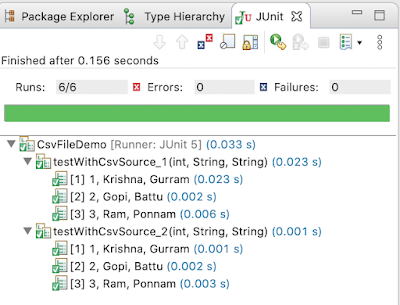@CsvFileSource annotation is used to populate method parameters from csv files from the class path.
For example, I created ‘employeeInfo.csv’ file under src/test/resources folder.
employeeInfo.csv
1, Krishna, Gurram 2, Gopi, Battu 3, Ram, Ponnam
We can pass the data from employee.csv as arguments to test method using @CsvFileSource annotation.
@ParameterizedTest
@CsvFileSource(resources = "/employeeInfo.csv")
void testWithCsvSource_1(int id, String firstName, String lastName) {
Employee emp = new Employee(id, firstName, lastName);
String expected = emp.getId()+","+emp.getFirstName()+","+emp.getLastName();
String actual = EmployeeUtil.getEmployeeAsString(emp);
assertEquals(expected, actual);
}
How to handle if csv file has header?
Using 'numLinesToSkip' attribte, you can skip number of lines. Since header span single line, I can skip one line and proceed with data.
employeeInfoWithHeaders.csv
id, firstName, lastName 1, Krishna, Gurram 2, Gopi, Battu 3, Ram, Ponnam
Using 'numLinesToSkip' attribte, you can skip number of lines.
@ParameterizedTest
@CsvFileSource(resources = "/employeeInfoWithHeaders.csv", numLinesToSkip = 1)
void testWithCsvSource_2(int id, String firstName, String lastName) {
Employee emp = new Employee(id, firstName, lastName);
String expected = emp.getId()+","+emp.getFirstName()+","+emp.getLastName();
String actual = EmployeeUtil.getEmployeeAsString(emp);
assertEquals(expected, actual);
}
Find the below working application.
Employee.java
package com.sample.app;
public class Employee {
private int id;
private String firstName;
private String lastName;
public Employee() {
}
public Employee(int id, String firstName, String lastName) {
super();
this.id = id;
this.firstName = firstName;
this.lastName = lastName;
}
public int getId() {
return id;
}
public void setId(int id) {
this.id = id;
}
public String getFirstName() {
return firstName;
}
public void setFirstName(String firstName) {
this.firstName = firstName;
}
public String getLastName() {
return lastName;
}
public void setLastName(String lastName) {
this.lastName = lastName;
}
}
EmployeeUtil.java
package com.sample.app.util;
import com.sample.app.Employee;
public class EmployeeUtil {
public static String getEmployeeAsString(Employee emp) {
if(emp == null) {
return "none";
}
return emp.getId()+","+emp.getFirstName()+","+emp.getLastName();
}
}
CsvFileDemo.java
package com.sample.app;
import static org.junit.jupiter.api.Assertions.assertEquals;
import org.junit.jupiter.params.ParameterizedTest;
import org.junit.jupiter.params.provider.CsvFileSource;
import com.sample.app.util.EmployeeUtil;
public class CsvFileDemo {
@ParameterizedTest
@CsvFileSource(resources = "/employeeInfo.csv")
void testWithCsvSource_1(int id, String firstName, String lastName) {
Employee emp = new Employee(id, firstName, lastName);
String expected = emp.getId()+","+emp.getFirstName()+","+emp.getLastName();
String actual = EmployeeUtil.getEmployeeAsString(emp);
assertEquals(expected, actual);
}
@ParameterizedTest
@CsvFileSource(resources = "/employeeInfoWithHeaders.csv", numLinesToSkip = 1)
void testWithCsvSource_2(int id, String firstName, String lastName) {
Employee emp = new Employee(id, firstName, lastName);
String expected = emp.getId()+","+emp.getFirstName()+","+emp.getLastName();
String actual = EmployeeUtil.getEmployeeAsString(emp);
assertEquals(expected, actual);
}
}
Run above application and you can observe that the test cases executed with the data from csv files.
Previous Next Home

No comments:
Post a Comment